| | | | | | | Presented By Blockchain.com | | | | Axios World | | By Dave Lawler ·Apr 12, 2021 | | Welcome back to Axios World. - Tonight's edition (1,673 words, 6 minutes) covers a busy few days for Iran-related news and global elections.
- Heads-up: The Axios app is 1 year old today. Download it here to get breaking news alerts, access Axios podcasts, and create your own custom news feed from over 25 channels.
New arrival? Sign up. | | | | | | 1 big thing: Natanz explosion could derail nuclear talks | 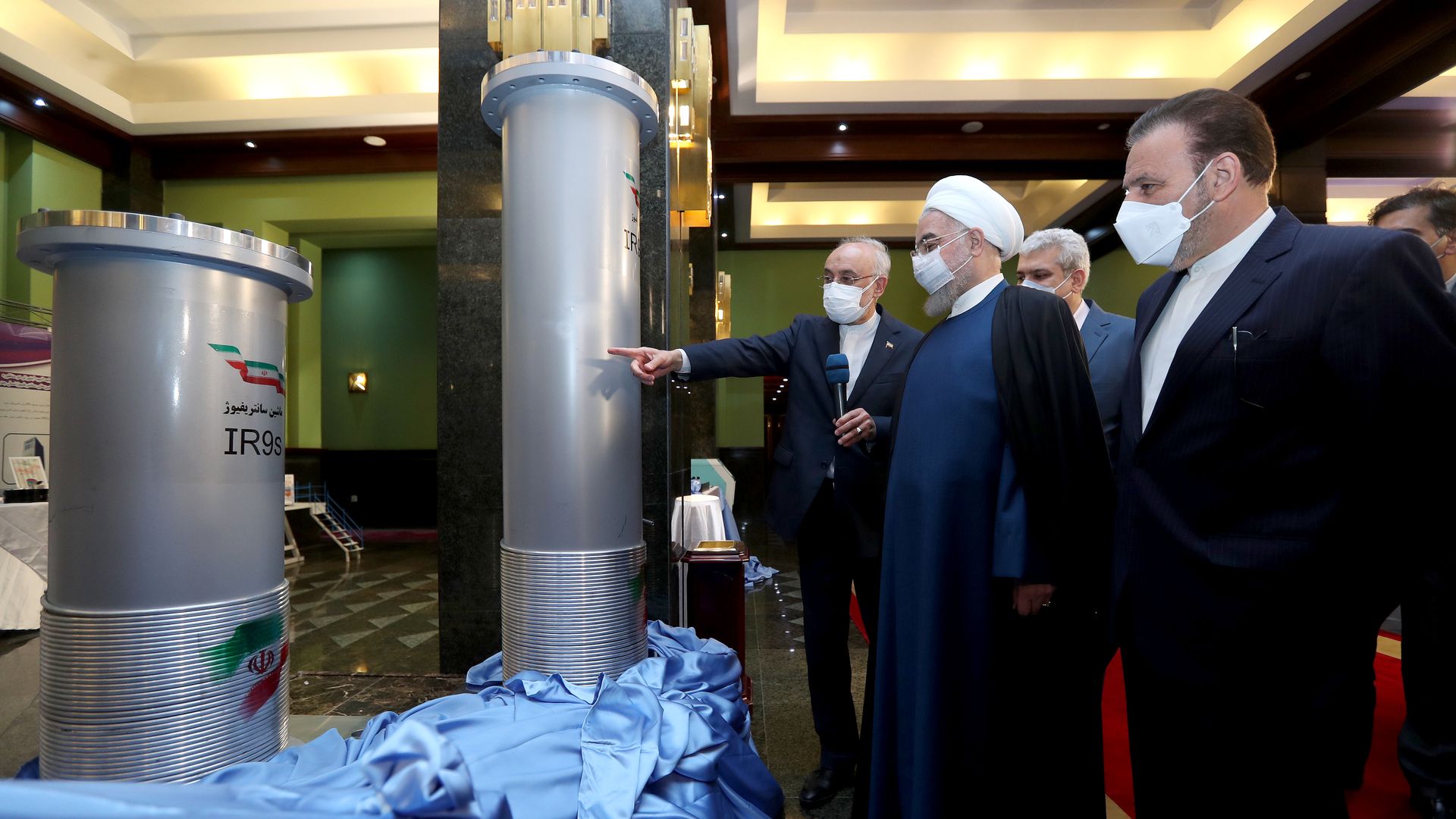 | | | Iranian President Hassan Rouhani (2nd R) at a Nuclear Technology Day celebration on Saturday. Photo: Iranian Presidency/Handout/Anadolu Agency via Getty Images | | | | Iranian Foreign Minister Mohammad Javad Zarif tonight threatened retaliation against "any power with knowledge" of Sunday's attack on an Iranian nuclear site, and he said Iran would now accelerate its violations of the 2015 nuclear deal until the U.S. lifts sanctions. Why it matters: The apparent act of Israeli nuclear sabotage, which caused a blackout at the underground Natanz enrichment facility and may have caused significant damage, comes as the U.S. attempts to revive the nuclear deal. - If the Iranians do take additional steps beyond the boundaries of the deal, it could force the U.S. to move more quickly to salvage the deal, or possibly to walk away from the table.
What they're saying: White House press secretary Jen Psaki said the Biden administration "was not involved in any manner" in Sunday's attack, but she wouldn't say whether it might hamper the ongoing nuclear diplomacy. - Psaki did say the U.S. still expects Iran to take part in this week's indirect nuclear talks in Vienna, which are set to resume on Wednesday.
Before that happens, top national security officials from the U.S. and Israel will convene virtually tomorrow for a second round of high-level strategic talks on Iran, Axios' Barak Ravid reports. - Led by national security adviser Jake Sullivan and his Israeli counterpart, Meir Ben-Shabbat, top national security and intelligence officials first met last month to share intelligence on Iran's nuclear program.
- Between the lines: One of the main understandings that emerged was a mutual "no surprises" policy. But it's unclear whether the Natanz explosion or Israel's recent strikes on Iranian ships came as a surprise to the White House.
- The Biden administration has distanced itself from both, creating the impression it disapproves of Israel's actions.
The other side: Prime Minister Benjamin Netanyahu has been increasingly vocal about his concerns around the nuclear talks. - He recently said that Israel would not be bound by any U.S.-Iran deal, hinting that the Vienna talks will not prevent Israel from continuing its operations against Iran.
Meanwhile, Zarif wrote UN Secretary-General António Guterres tonight, contending that a "grave war crime" had been committed at Natanz. - Zarif accused Israel of attempting to use the attack to thwart the nuclear talks, according to state media. He said those efforts would fail, and "we will take revenge on the Zionists themselves."
The state of play: The Vienna talks are the most significant step yet toward a joint return to the nuclear deal. But while last week's talks "met expectations," a senior State Department official on Friday cast doubt on Iran's "seriousness of purpose." - Iran refused to meet directly with the U.S. but held three days of talks with the nuclear deal's other signatories, while the U.S. communicated through EU representatives.
- "We think it would be better if we could sit down with the Iranians. We're not going to pay a price for that, so if they don't want to meet with us, too bad," the senior official said.
What to watch: There are at least two major hurdles from the U.S. perspective: Iran is insisting that the U.S. lift all of its sanctions before Iran unwinds its nuclear violations, and it's including even sanctions that aren't linked to the nuclear program. - The talks will be "heading toward an impasse" if Iran's position remains unchanged, the official said on Friday.
|     | | | | | | 2. Global elections roundup: Surprises and shams |  | | | Celebrations in Quito, Ecuador. Photo: Josep Vecino/Anadolu Agency via Getty | | | | Defying expectations, voters in Ecuador's presidential election opted on Sunday for a conservative ex-banker, Guillermo Lasso, over a protege of leftist former President Rafael Correa. Why it matters: The leftist contender, Andrés Arauz, conceded defeat in an election that was seen as a referendum on Correa, who remains highly influential despite having fled to Belgium to escape a corruption conviction. - Lasso will replace the deeply unpopular Lenín Moreno, who was Correa's chosen successor but broke from him after defeating Lasso in the 2017 election.
- What to watch: Lasso will inherit a polarized political system and a divided National Assembly, as well as an economic crisis exacerbated by the pandemic.
On Sunday in Peru, Pedro Castillo, a far-left candidate who was eighth in the presidential polls just a few weeks ago, finished first in the unofficial results with around 19% of the vote. Driving the news: Best known as one of the leaders of a 2017 teachers strike, Castillo has promised to rewrite the constitution and give the state a bigger role in industries like mining. - The race for the second spot in the runoff is too close to call, but Keiko Fujimori, the deeply polarizing daughter of a former strongman president who was jailed for human rights abuses, is currently second with 13%.
- Some commentators have described that potential matchup as "far-left vs. far-right."
- The big picture: There is widespread voter disillusionment in Peru, where politics were deeply dysfunctional even before the country faced one of the world's worst coronavirus outbreaks. Nearly every president since the 1980s has faced corruption charges.
There was no such drama in the three African elections held since Friday. - In Djibouti, President Ismail Omar Guelleh claimed a fifth term on Friday with nearly 99% of the vote. Needless to say, opposition was not welcome.
- In Chad, the case was similar on Sunday as President Idriss Déby sought a sixth term. Most opposition leaders boycotted the race, and human rights groups reported crackdowns on protesters.
- In Benin, President Patrice Talon once promised he'd serve only one term. On Sunday, he ensured he faced little opposition as he secured a second. Talon has pulled the country in a sharply authoritarian direction.
|     | | | | | | 3. Great power vaccination | 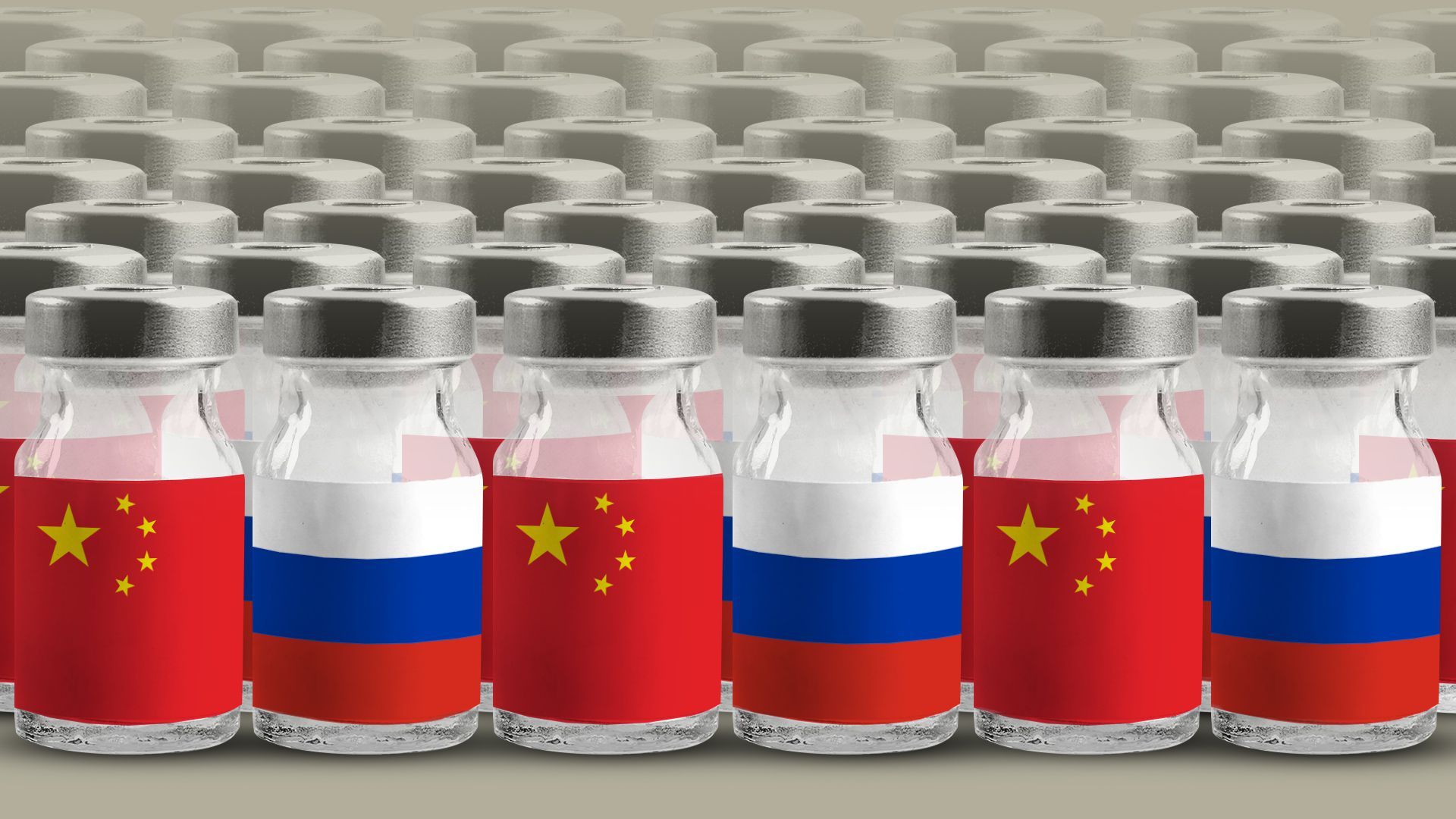 | | | Illustration: Aïda Amer/Axios | | | | 1. The director of the Chinese CDC acknowledged on Saturday that China's homegrown COVID-19 vaccines "don't have very high protection rates." - Officials are considering changing the dosages of the vaccines or giving one dose of two different vaccines, he said.
- China is trying to ramp up its domestic vaccination campaign, which has been marred not by skepticism of the shots themselves but by a lack of urgency because the virus is largely under control. Community workers are knocking on doors and offering vaccines, WSJ reports.
- The state of play: China has led the world in vaccine exports, sending at least 115 million doses to some 27 countries, according to data from Airfinity.
2. Regulators in Slovakia have claimed Sputnik V vaccines shipped from Russia had different characteristics than the vaccine that received positive reviews in the Lancet medical journal, raising serious quality control concerns. - The backstory: The Lancet article, which found the vaccine to be 92% effective, gave a massive boost to Sputnik's global reputation. Sputnik's makers referred to the Slovakian claims as "fake news."
- Several EU countries are in talks to buy or produce the vaccine. Russia has exported it around the world, but often in fairly small quantities due to insufficient manufacturing capacity.
3. Secretary of State Tony Blinken told NBC's "Meet the Press" on Sunday that the U.S. would become "the world leader on helping to make sure that the entire world gets vaccinated." - Yes, but: He offered no details on when or how the U.S. would begin sharing doses with the rest of the world except to say a framework was being developed.
- What to watch: The U.S. is late to the vaccine diplomacy game but could indeed become an indispensable player once exports begin since China, Russia and India are all hitting significant snags.
|     | | | | | | A message from Blockchain.com | | Worried you missed the boat on Bitcoin? It's not too late | | |  | | | | Blockchain.com allows you to buy, sell, trade, swap and earn cryptocurrencies like Bitcoin. The background: With over 70M Wallets in 200 countries, Blockchain.com is trusted by millions of people to trade, store and use crypto. So, what are you waiting for? | | | | | | 4. Europe: The battle to succeed Merkel | 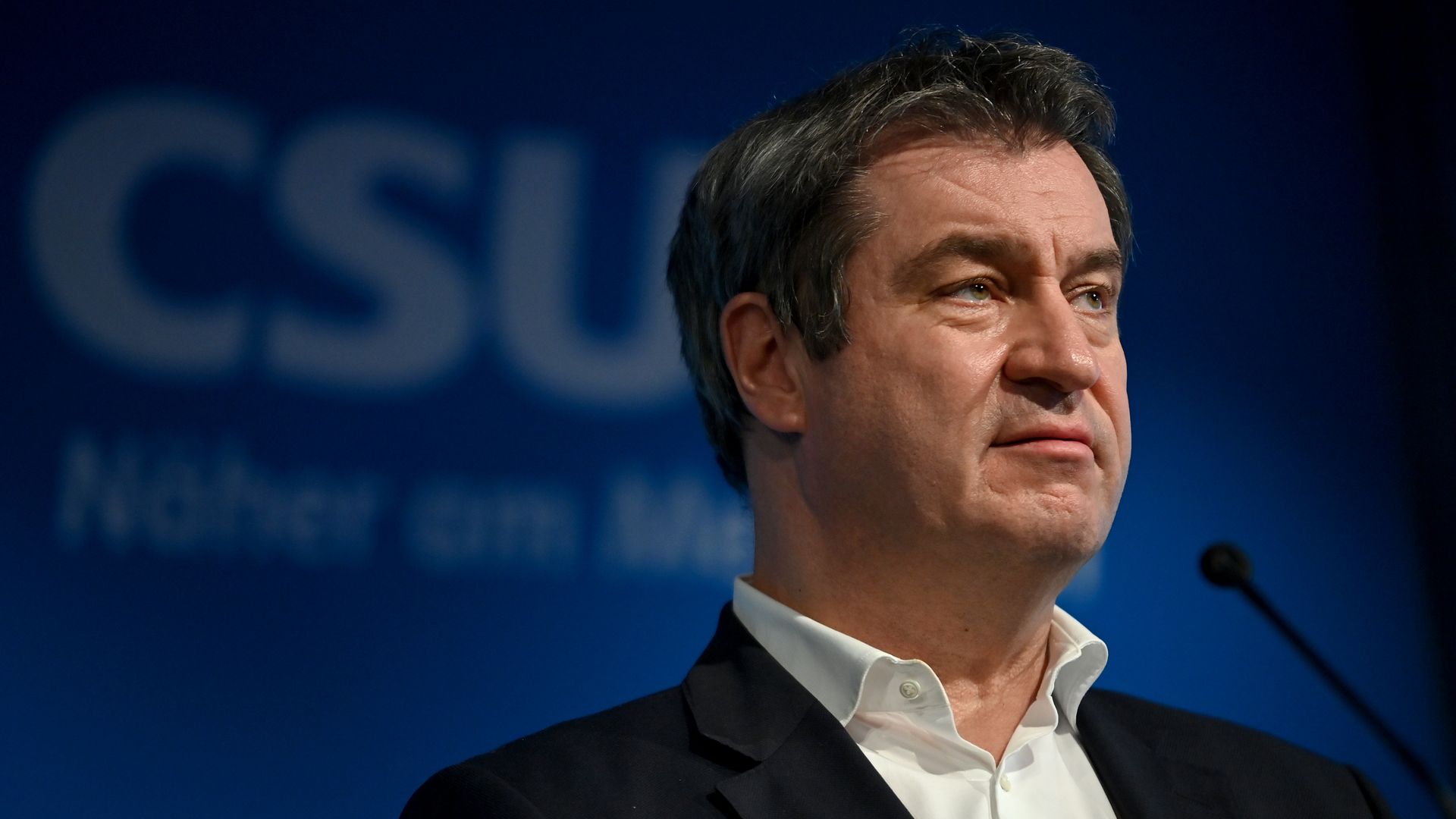 | | | Söder announces he's running. Photo: Peter Kneffel/picture alliance via Getty | | | | It's usually little more than a coronation, but the race to lead the German center-right into September's election just got interesting. Driving the news: Markus Söder, the prime minister of Bavaria, announced Sunday that he would be challenging Armin Laschet, who was only recently elected as the leader of the Christian Democratic Union (CDU) and thus Angela Merkel's de facto heir apparent. - As CDU leader, Laschet is the conventional choice to run for chancellor. A centrist in the Merkel mold, he would effectively be a continuity candidate.
- But Söder, the leader of the CDU's much smaller Bavarian sister party, is far more popular. With the CDU falling in the polls, his star has been rising.
- Söder said he'd talked his decision over with Laschet before jumping into the contest, and "we came to the conclusion that both of us are suitable and both are ready."
The state of play: It's not yet clear when the party will formally pick its candidate, but the CDU's top brass is already rallying behind Laschet, in an indication that he remains the favorite. - The CDU's recent stumbles have led to a real prospect that when Merkel steps down after 16 years, she will be replaced by a chancellor from a different party.
|     | | | | | | 5. Potential White House pick sparks blowback | 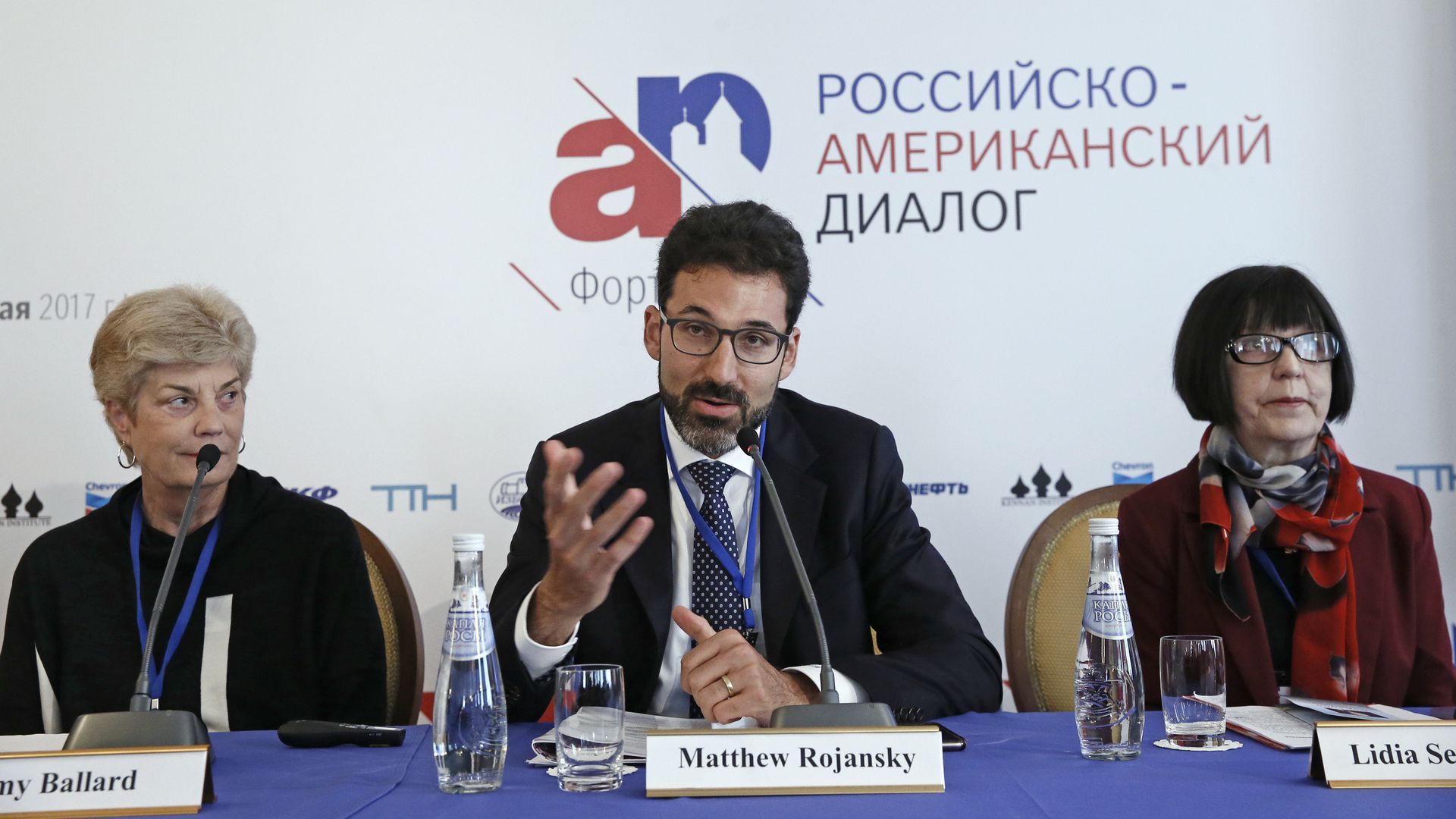 | | | Rojansky. Photo: Alexander Shcherbak\TASS via Getty Images | | | | President Biden is considering appointing Matthew Rojansky, head of the Wilson Center's Kennan Institute, as Russia director on the National Security Council, my colleagues reported on Sunday. Why it matters: That report led to outrage from Russia hawks, who view Rojansky as too soft on Vladimir Putin. - Bill Browder, the financier turned activist, claimed that opposition leader Alexei Navalny would be "as good as dead" if Rojansky was picked, because Moscow would see it as a sign that President Biden wouldn't retaliate. Others piled on, expressing similar sentiments.
- Rojansky's views cut against the grain in the current environment, but they're hardly extreme. He has argued for "peaceful coexistence" with Moscow and for the U.S. to deal with Putin's Russia as it is, rather than attempting to change the regime or shape its behavior.
My thought bubble: This is a reminder that, particularly in this portfolio, the band of "acceptable" policies in Washington can be quite narrow. |     | | | | | | 6. What I'm reading: A shrinking city in the Russian Arctic | 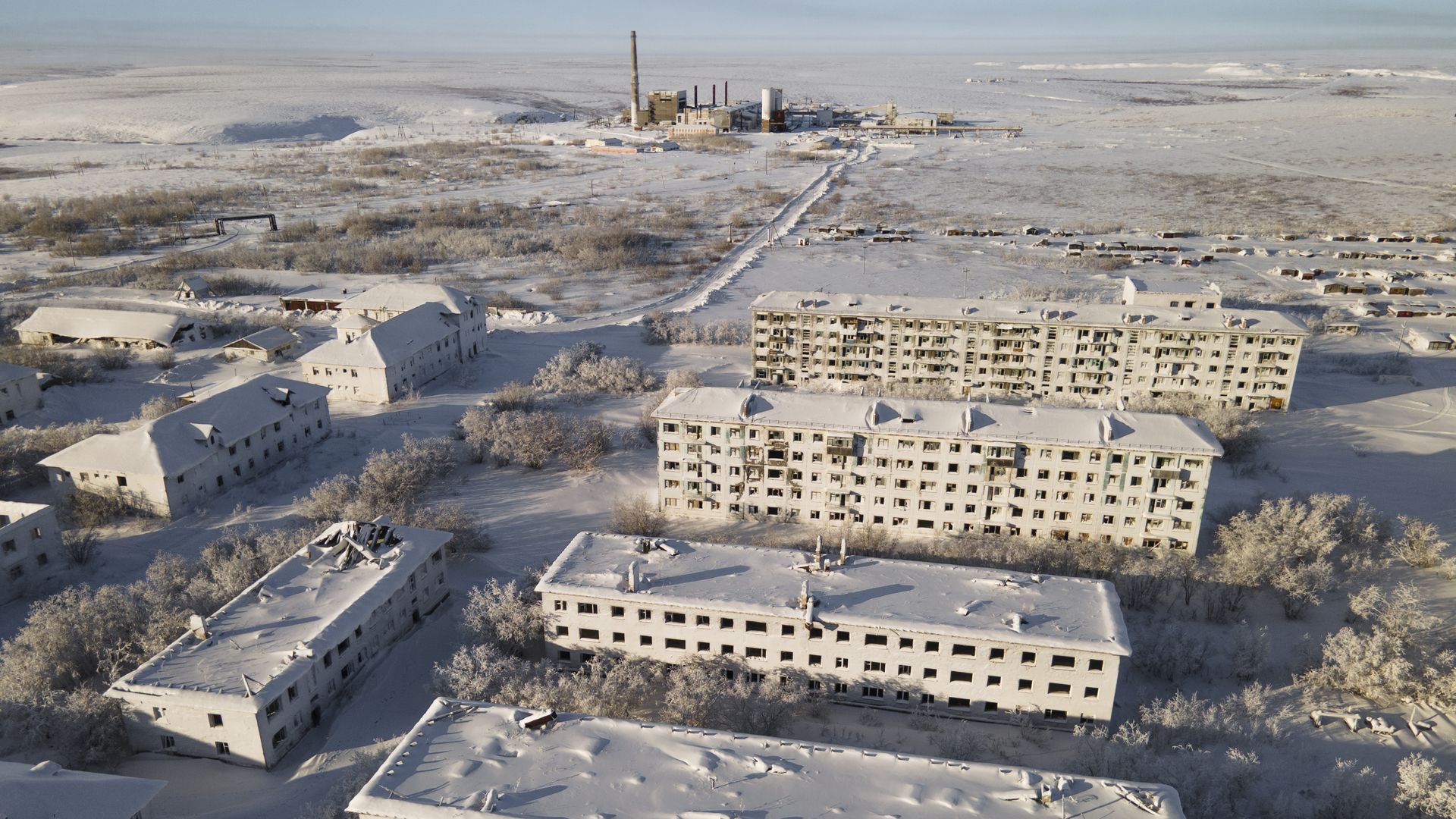 | | | Abandoned apartment buildings in Vorkuta. Photo: Maria Passer/Anadolu Agency via Getty | | | | The first to arrive were prisoners from Stalin's gulags. By the time the Soviet Union collapsed 50 years later, there were 250,000 people living in the city they founded, 100 miles north of the Arctic Circle. - The Soviet government built a city in such an inhospitable place for two reasons: to prove that they could, and to mine coal.
Now, as Matthew Luxmoore writes in a dispatch for Radio Free Europe, the ideological imperative is gone, and the coal industry is struggling. - Now home to 60,000 people, many of them getting on in years, Vorkuta is Russia's fastest-shrinking city.
- You can buy an apartment there for $1,000, but many residents are simply leaving them vacant and departing for warmer climes.
"I look at all this and see our future," one local resident told Luxmoore, gazing at the now-vacant buildings in which she had grown up. - "This city only exists for the extraction of natural resources. Once they're gone, the city will go. And they'll have the perfect setting for movies about the zombie apocalypse."
Read the piece. |     | | | | | | 7. Stories we're watching | 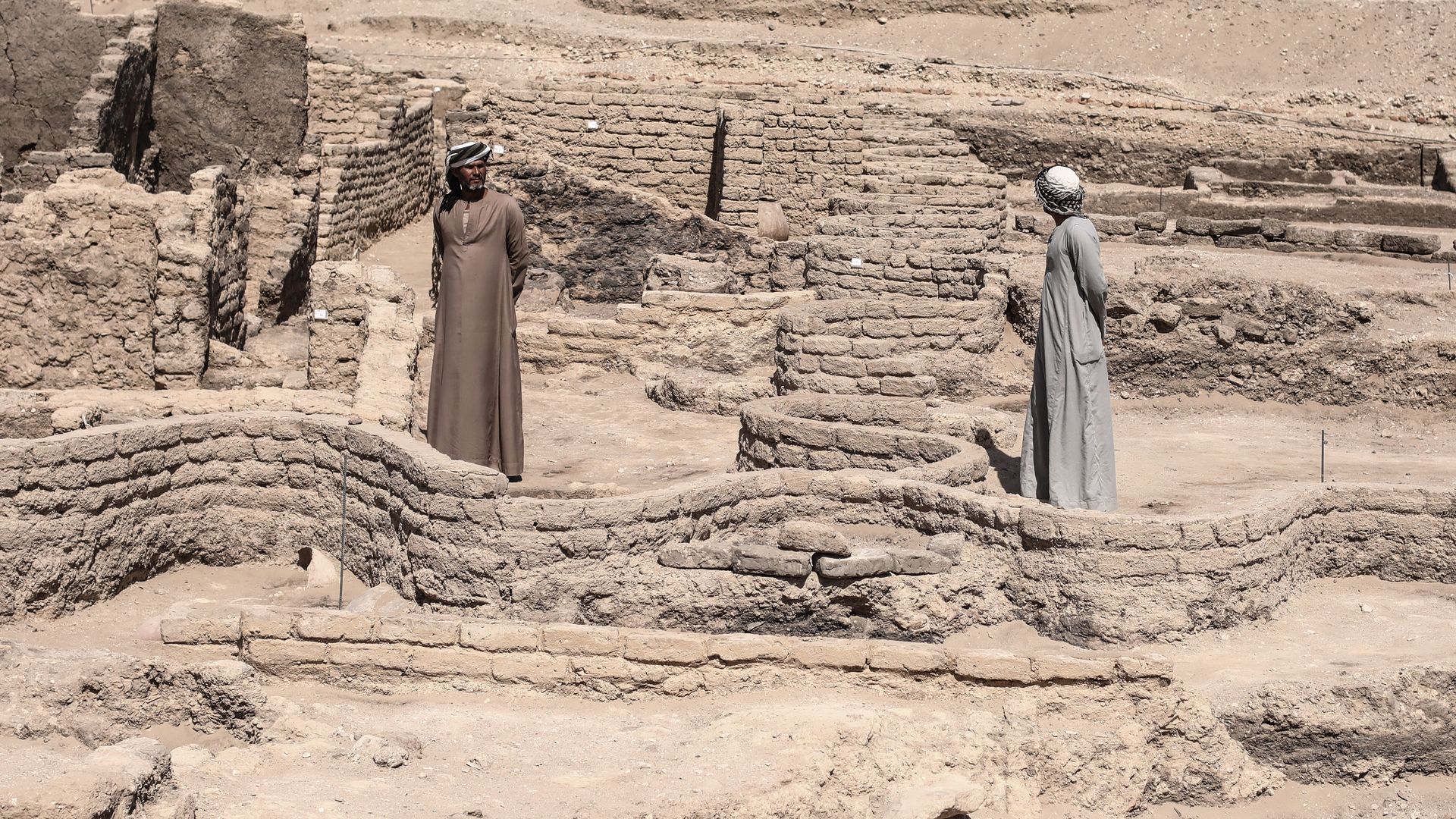 | | | The ruins of a 3,000-year-old lost (and newly found) city near Luxor, Egypt. Photo: Stringer/Anadolu Agency via Getty | | | - On the front lines of the border crisis
- Myanmar security forces kill over 80 in a single day
- 19 officers injured as violence flares in Belfast
- Blinken slams China for refusing to cooperate on COVID
- Iran tightens restrictions as fourth wave hits
- Brits flock to pubs
- In photos: Egypt's "lost golden city"
Quoted: "Orbiting Earth in the spaceship, I saw how beautiful our planet is. People, let us preserve and increase this beauty, not destroy it!" — Yuri Gagarin, who became the first person in space 60 years ago today. |     | | | | | | A message from Blockchain.com | | Worried you missed the boat on Bitcoin? It's not too late | | |  | | | | Blockchain.com allows you to buy, sell, trade, swap and earn cryptocurrencies like Bitcoin. The background: With over 70M Wallets in 200 countries, Blockchain.com is trusted by millions of people to trade, store and use crypto. So, what are you waiting for? | | | | | | Axios thanks our partners for supporting our newsletters.
Sponsorship has no influence on editorial content. Axios, 3100 Clarendon Blvd, Suite 1300, Arlington VA 22201 | | | You received this email because you signed up for newsletters from Axios.
Change your preferences or unsubscribe here. | | | Was this email forwarded to you?
Sign up now to get Axios in your inbox. | | | | Follow Axios on social media:    | | | | | |










No comments:
Post a Comment